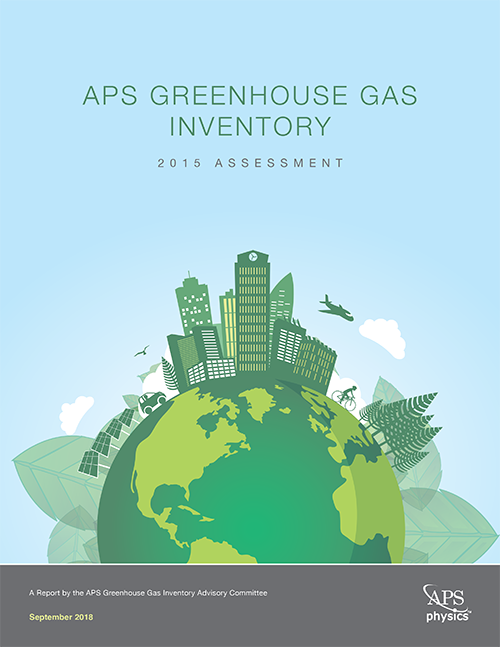APS GHG Inventory Project
In 2015, the American Physical Society (APS) released its Statement on Earth’s Changing Climate. As a follow-up activity, the Society conducted an internal analysis of its day-to-day operations and select associated activities to determine its 2015 Greenhouse Gas (GHG) inventory, or carbon footprint. The GHG Inventory Advisory Committee oversaw this project and provided a set of recommendations to the APS CEO aimed at reducing and/or mitigating the Society’s GHG emissions.
APS’s 2015 GHG Inventory was established according to The Climate Registry’s (TCR’s) well-established and industry recognized standards. TCR’s reporting protocol divides GHG emissions into three categories, or Scopes, when determining an organization’s GHG inventory. The Scopes are defined as:
- Scope 1: Emissions from direct energy combustion that occurs on-site or from owned vehicle operation; also includes direct industrial/HVAC gas emissions
- Scope 2: Indirect emissions resulting from the purchased energy generation, often in the form of electricity, steam (district heating), or chilled water (district cooling)
- Scope 3: Other indirect emissions that are a result of organizational activities. Examples include emissions from business travel, employee commuting, waste management and supplier or outsourced activities
In addition to APS’s Scope 1 and 2 GHG emissions, the society also estimated the Scope 3 GHG emissions associated with APS co-located servers, APS member travel to/from APS national meetings, and APS’s investment portfolio.
Upon completion of this internal analysis, APS became first scientific society in the United States to broadly assess and publish its GHG emissions. APS will continue to be at the forefront of this important work as the Society works to implement the Advisory Committee’s recommendations.
Findings
Scope 1 and 2 emissions from APS’s three office locations – College Park, MD; Ridge, NY; Washington, D.C. – totaled 817.58 metric tons (mt) CO2e. As noted in the report, APS has varying degrees of control over the energy decisions made at each of its office locations.
APS’s Scope 3 emissions from the activities mentioned above totaled nearly 75,000 mt CO2e and clearly eclipsed the GHG impact of APS’s daily operations. Therefore, the majority of the Advisory Committee’s recommendations concern Scope 3 emissions.
In particular, member travel and APS’s investment portfolio comprised the bulk of the Society’s 2015 GHG inventory. Member travel to/from the 2015 March meeting alone was estimated to contribute over 7,000 mt CO2e. APS worked with Anthesis, a consultancy skilled in GHG inventory development, to develop an appropriate methodology to calculate its investment-related GHG emissions. These emissions were estimated to be greater than 62,000 mt CO2e.
Current Actions
Scopes 1 and 2:
Building management for the National Press Building – APS’s Washington, D.C. office location – has developed a multi-year plan aimed at increasing the building’s energy efficiency and reducing its GHG impact.
Scope 3:
When soliciting bids to host future APS national meetings, APS’s request for proposal (RFP) will include questions focused on a conference site’s GHG impact. APS’s RFP will include inquires related to a conference site’s environmental policies, transportation options, and energy use.
APS will provide an estimated GHG impact of member travel to/from potential meeting sites to the Unit leadership responsible for selecting conference locations. This information may be used as one of the selection criteria when choosing national meeting locations.
APS will pilot test a member-driven donation program aimed at mitigating the carbon cost of member travel to and from annual meetings at an upcoming meeting.
Going Forward
Supporting Materials
- APS's Statement on Earth's Changing Climate
- Recommendations Memo

- GHG Advisory Biographies
- FAQ
- Scope 1 & 2 GHG Story
- Scope 3 GHG Story
APS Actions: Additional Information
APS Member Comments
APS encourages member suggestions about implementation, future analyses, and outreach. Please consider submitting a suggestion.

